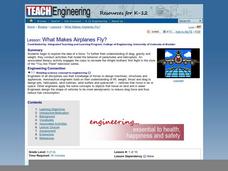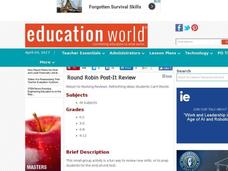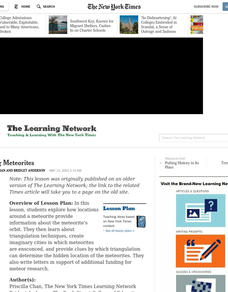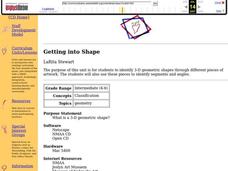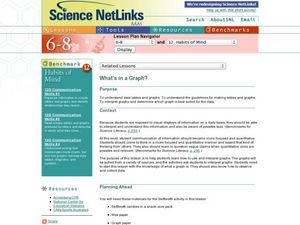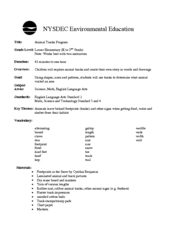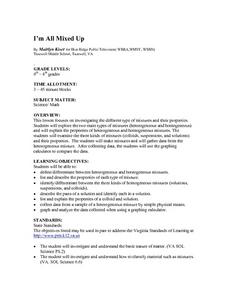Curated OER
Relations
Pupils identify, compare, and analyze shapes and numbers. In this analogies and comparison math lesson, students warm up by completing 4 worksheets to familiarize themselves with analogies. In small groups, pupils are challenged to...
Curated OER
Mice Rule!
Young scholars explain what biodiversity is and how adaptive features are maintained in a population. In this biodiversity lesson students complete a simple activity involving mouse populations.
Curated OER
What Makes Airplanes Fly?
Students examine force and conduct activities that model parachutes and helicopters. In this airplanes lesson students identify the forces that make airplanes fly higher and land.
Curated OER
Fantastic Fossils
Students learn about the kinds of fossils and what scientists can learn from them. In this earth science lesson, students are told how engineers and paleontologists work together. Then students create a "fossil fondue" and...
Curated OER
Let's Get Physical
Explore the benefits of physical activity and how it will affect your students' health. Students track their physical activities for one week and then compare their results. Collaboration with a math teacher woould be useful as it...
Curated OER
Round Robin Post-It Review
Learners of all ages participate in a unique review activity. They work in a small group setting on individual review questions designed by the teacher. Each individual answers a key review question on a notecard or sticky note and...
Curated OER
Lesson 2 Ordering Numbers
Math wizards begin the lesson by comparing and ordering rational numbers. Using a number line, they discover the relationship between the numbers and practice ordering them in the correct way. They also review proper techniques for...
Curated OER
Altitude Tracking
Young scholars estimate the altitude of a rocket during several flights. They create their own altitude tracking devise. They examine and discuss their results at the end of the activity.
Curated OER
Human Fingerprints: No Two The Same
Students will be offered numerous opportunities to further enhance their observational skills as well as the integration of math with their continual exposure to the metric system, measurement, and graphing to represent their data....
Curated OER
And You Thought Gasoline Was Expensive!
Students carry out a cost analysis. In this comparative math lesson, students compare the cost of equal measures of gasoline to mouthwash, house paint, fruit juice, white-out, and other liquids.
Curated OER
Mapping Meteorites
After reading an article, "Cameras Capture a 5-Second Fireball and Its Meteorite's Secrets," space science superstars use the triangulation method to determine the location of a distant object. In-class activities and homework are...
Curated OER
What's The Weather?
Students explore the role that remote sensing plays in predicting our weather. Students investigate weather websites, and read about the three kinds of clouds. Students record and draw their observations in science journals.
Curated OER
How Long is a Hot Dog? Weight, Weight! Don't tell me!
Primary learners participate in activities that help them explain how different things are measured. They create their own access number chart.
Curated OER
Detective Digis and the Computer Caper
Mathematicians participate in an hands-on activity to investigate the binary number system and write messages in binary code and have classmates decipher the messages. A said video on the topic does not seem to be available, but the...
Curated OER
Getting into Shape
Students identify 3-D geometric shapes through different pieces of artwork. They examine and identify segments and angles. Students act out shapes and create a piece of artwork. Additional cross curriculum activities are listed.
Curated OER
What's in a Graph?
Students explore how to use and interpret graphs. The graphs are pulled from a variety of sources, and the activities ask students to interpret graphs. They start this lesson with knowledge of what a graph is. Students also know how to...
Curated OER
Children's Literature Across the Curriculum Ideas-Two Eyes, A Nose, and A Mouth
Students read Two Eyes, A Nose, and A Mouth by Roberta Grobel Intrater. They complete a variety of cross-curricular activities surrounding faces and facial features. Included are reading, art, math, science, writing, social studies, and...
Curated OER
Pebbles, Sand and Silt -- Categorizing Fiction and Informational Books
Primary readers complete the activities in a Pebbles, Sand and Silt FOSS kit. As a class, they are given a group of rocks and they are to categorize them based on their activities in the FOSS kit. They use this information and apply it...
Curated OER
Animal Tracks Program
Entice your learners with this lesson on animal footprints. After reading the story Footprints in the Snow by Cynthia Benjamin, they use photos to identify animals and their footprints. Then they participate in an activity to classify...
PBS
Surface Area and Volume
You and your class will like this lesson on using visual models to relate the volume and surface area of solid shapes. Learners construct three-dimensional forms using nets. They calculate the surface area and volume for each and then...
Curated OER
I'm All Mixed Up
Middle school scientists compare and contrast heterogeneous and homogeneous mixtures. They differentiate solutions, colloids, and suspensions by examining samples of each. Note that the bulk of the lesson plan directs you how to...
Curated OER
Nutrition in Me!
Third graders explain the basic healthy eating and physical activity concepts. In this healthy lifestyles lesson, 3rd graders describe two main components of a healthy lifestyle, demonstrate two different types of physical...
Curated OER
A Honey of a Hexagon
Students explore how bees make honey and why the hexagon is the best basic pattern for the honeycomb through the use of a video and hands-on activities with honeycombs and geometric shapes.
Curated OER
Soil Scrolls
Third graders examine soil samples and explore the what happens in each layer of the subsoil. They work in cooperative groups to create a scroll that shows what takes place in each layer, and discuss why much of the activity is in the...




